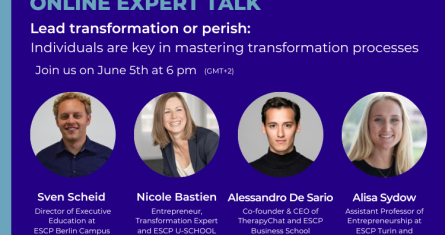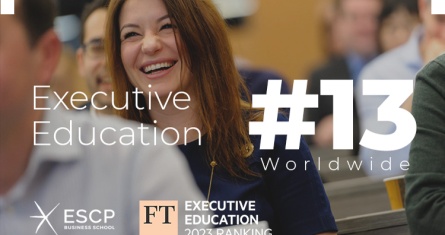Transformation, entrepreneurship, and innovation are crucial in fostering economic development, social progress, and the advancement of societies as they navigate an ever-changing world.
These concepts are deeply interlinked. Transformation is about redesigning businesses from the ground up, driven by digital technologies and sustainability, and requires entrepreneurial thinking and innovative approaches to drive change and create new opportunities.
Lead Transformation or Perish!
In this interview, Entrepreneurship Professors Alisa Sydow and Christoph Seckler took the time to address the topics of transformation, entrepreneurship, innovation and the most valuable tools required to lead successful transformation projects nowadays:
Can you tell us briefly about your journeys? What made you decide to focus on entrepreneurship?
Alisa: I am passionate about how entrepreneurs as individuals can build up not only their businesses, but also communities, and ecosystems. Thus, I decided to focus on entrepreneurship with a specific focus on entrepreneurship in developing economies because I believe it is the origin and engine for creating impact and sustainable development. As I want to be part of shaping our future, I decided to have a 360-degree perspective on entrepreneurship by doing research, by teaching and by being an entrepreneur.
Christoph: To me, entrepreneurship extends beyond simply launching a startup. It involves the ability to recognise and capitalise on opportunities, as well as develop innovative solutions that address the needs of people. In my view, we require more skilled entrepreneurs and entrepreneurial leaders to navigate the challenges and capitalise on the opportunities that lie ahead. This is why I decided to become a Professor for Entrepreneurship.
Transformation is a frequently used buzzword. What does it mean to you, and what motivated you to create a programme around it?
Alisa: We use quite a lot of different words to describe a movement, a change. In this specific moment, transformation has gained attention as a keyword to represent advancements that are driven by new technologies such as AI and blockchain. For me, the particularity of the idea of “transformation” is the fact that it is a holistic and fundamental change in how we design business models and how we do business. It is not about launching a new product into the market, but it is about redesigning businesses from scratch driven by digital technologies and sustainability.
Christoph: Although many may dismiss the term "transformation" as a vague buzzword, its impact on our daily lives, particularly in the workplace, is very real and tangible. Transformation encapsulates the sweeping changes we are currently experiencing, driven by technological advancements such as AI (e.g., ChatGPT), biotech, and robotics, as well as economic, social, and political changes like the emergence of new business models, growing awareness of sustainability, and shifting world order. For companies, this transformation presents a critical choice: to seize the new opportunities that arise or face potential extinction. We firmly believe that effective entrepreneurial leaders are essential to seizing these opportunities, which is why we developed a unique programme to nurture and develop entrepreneurial leaders who can drive transformation forward.
Why do you think that prioritising innovation is increasingly important?
Alisa: Innovation has always been important as it is part of shaping the future proactively. Yet, I do believe that it is even more important in this specific moment as we are facing severe challenges. Climate change is definitely an important driver; for instance, “200 million people in the world, more than three times the UK population, will live below the tideline by the end of this century if levels continue to rise” (Nature Communications). And each year, circa 12 million hectares of land are lost to desertification, land degradation and drought. This represents a surface area equal to the entire arable land of Germany. So we definitely need to find new ways to address these issues, meaning we need innovation that leads us to solutions.
Christoph: The answer to this question is straightforward. Business opportunities emerge at the crossroads of people's needs and the solutions that can be developed to fulfil those needs. Presently, we are witnessing massive shifts in both of these aspects, such as the growing demand for sustainable lifestyles and the rise of deep tech. Even long-established business opportunities like those involving petrol-run cars are experiencing significant disruption. Consequently, companies must keep innovating to stay ahead of the game, or risk being left behind and facing the possibility of business extinction.
What are the topics you think today’s entrepreneurs should focus on?
Alisa: We are living in a world, in which we have plenty of business ideas. I even agree with Roberto Verganti, saying that we have too many ideas, which he outlines in his book “Overcrowded”. So, I believe that there is not one specific topic we need to focus on when it comes to new business ideas. However, I think we need meaningful ideas that are able to generate not only an economic profit but also a social, and or environmental impact. This is what we really need!
Christoph: Amidst the sweeping changes of our transformative era, two areas stand out as particularly noteworthy: digitalisation and sustainability. Digitalisation is a fundamental force because it marks the first time in history that tasks traditionally reserved for human cognition are now performed by machines. This includes information processing, storage, and communication, with deep tech developments such as AI, blockchain, and biotech creating numerous novel opportunities. Thus, staying informed on key developments in this area is critical. Similarly, the field of sustainability is undergoing profound changes as the awareness of the need for sustainable practices grows. Conducting business as usual for another 130 years would spell disaster for our planet. Consequently, our consumption and production methods are poised to undergo dramatic shifts in the coming decades, with trends like the circular economy taking centre stage. By keeping abreast of these major trends, companies can remain ahead of the game.
What, according to you, are the most relevant tools required to successfully identify and lead meaningful transformational projects?
Christoph: Entrepreneurial leaders possess the unique ability to identify and capitalise on opportunities, ultimately driving transformative change within their organisation. To achieve this, we believe that there are several invaluable tools that can aid in this process, including systematic identification of new opportunities, designing impactful business models, implementing strategies, and leading successful change. In addition to these tools, it is crucial for entrepreneurial leaders to hone their skill set, specifically in areas such as leading and building effective teams, analytical and creative problem-solving, stress management, communication, and self-awareness. At U-SCHOOL, we strive to equip entrepreneurial leaders with the necessary tools and skills to succeed, and inspire them through the expertise of world-renowned digitalisation and sustainability experts.
What is the advantage of learning these skills and tools in class rather than "learning by doing"?
Alisa: Entrepreneurship is a very complex process, in which we do not have a one best way that fits to most of the cases. However, within an entrepreneurial journey we need different elements such as tools, theory, experimentation and doing at different moments. That is why, U-School is composed of providing you with fundamental theories and tools, and of connecting you to our broader entrepreneurial ecosystem. By doing so, each participant will be able to enrich their experience by learning from mentors, investors, and serial entrepreneurs who are part of our community.
Who would you recommend this programme to?
Alisa: For everyone who feels the inner drive to start something new, but does not know how and where to start! This something new can be within a corporate environment, as well as a startup from scratch.
U-SCHOOL is an entrepreneurial acceleration programme designed to empower talented managers to drive innovation in their organisations.
You can dive deep into these topics by attending the “Expert Talk - Lead Transformation or Perish” masterclass on Monday, 5 June 2023 at 18:00 (CEST).
Alisa Sydow, PhD is Assistant Professor of Entrepreneurship & Innovation at ESCP Turin Campus and one of the founders of Nampelka. Alisa Sydow primarily teaches entrepreneurship and corporate entrepreneurship with a focus on opportunity formation and impact. Alisa’s research interests are in entrepreneurship in developing economies, entrepreneurial decision-making processes and entrepreneurial opportunities.
Prof. Dr. Christoph Seckler is a Junior Professor of Entrepreneurial Strategy at ESCP Business School in Berlin, Academic Director of U-SCHOOL, co-founder of the Center for Design Science in Entrepreneurship, and included in the “Top 40 Under 40” and “Top10 Upcoming Business Scholars” of the German magazine Capital. Christoph believes that it is essential to have excellent entrepreneurial leaders to make transformation happen. He teaches courses at the intersection of entrepreneurship and strategy across a variety of programmes at ESCP Business School.



